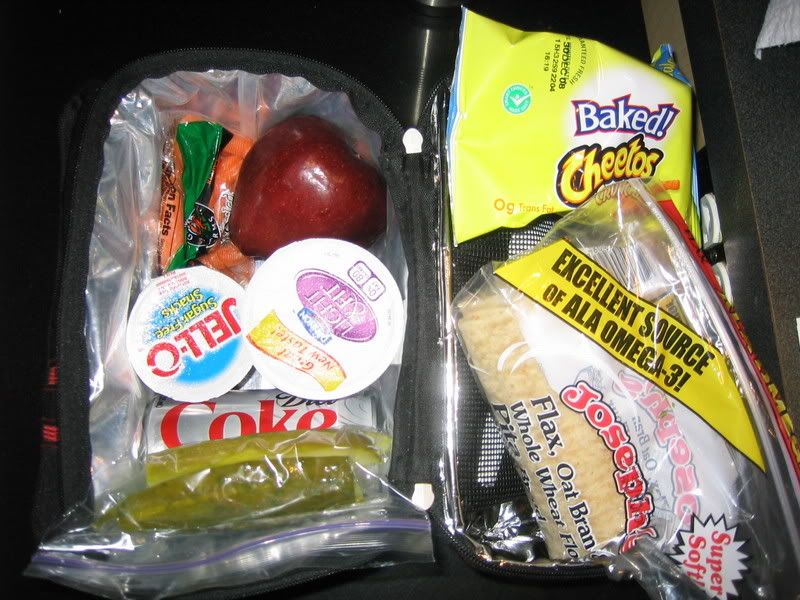In keeping with my fitness routine, I thought I'd share my normal workday lunch:
There's a red delicious apple for my mid-morning snack (60 calories). For lunch, a ham lavash wrap with spicy mustard and diced lettuce and onion (200 calories), baked Cheetos™ snack chips (100 calories), pickles (20 calories), a Diet Coke, and a sugar-free pudding for dessert (60 calories). For a mid-afternoon snack there's a yogurt (80 calories) and a small package of baby carrots (35 calories). Total expenditure for the day: Approximately 600 calories including the morning coffee.
It's plenty of food for the day, with snacks spaced pretty evenly to stave off the hungry horrors but not overload, causing the mid-afternoon slump. Add in a couple hundred calories for a breakfast bar or bowl of cereal, then 800 - 1000 calories for dinner, and the day's caloric intake is well under 2000 calories. The evening snack(s) round this number out to add more protein (peanut butter, beef jerky, etc.) and maintain weight for an active lifestyle.
Now, I'd be lying if I said this beat a buffalo chicken sandwich at the 99 Restaurant, or a couple slices of sausage and 'roni pizza from Sal's, but it sure beats a handful of rice cakes and a grapefruit, that's for sure. And that was my intent - I didn't want to just cut way back on the calories for a few weeks, then go back to my old ways. I'd done that pretty much my whole life, and as soon as I went "off" the diet, I'd gain all the weight I lost back (and then some, usually...)
Instead, I opted to make a lot of small changes that I could live with going forward; I wanted each change to be something that I would continue using rather than stop once the weight goal was achieved. It appears to be working - I've been within 5 pounds of the same weight since May of last year; I've never kept weight off this long before. Most experts call weight loss permanent if the weight is still off after two to five years; I'm not going to relax until I've hit the upper end of that figure.
Heck, I may sit down and write my diet book - call it "How I Did It" in honor of the question most often asked!
That is all.
Tuesday, November 18, 2008
Subscribe to:
Post Comments (Atom)








6 comments:
If you wrote it, I would read it.
No BS, the average weight on my ship is 250 lbs. We trade sleep for food all the time, then sleep after eating. Not good.
With the prepackaged stuff, how would you compare the cost of your diet to a standard eat-at-home style of eating/brownbagging?
Afterthought: most of us can lift our own body weight at least to chin height, or can hug-and-lug a lot more and walk with it, but the belts are straining over here!
Paul,
It's a bit more expensive, to be certain, but I like to be able to accurately tabulate my intake.
It's maybe $5 a week more to buy the packaged chips and pudding. I can live with that, really.
As for lifting your body weight, one of the interesting things I've found because of the weight loss is that I can do pull-ups now. I was never able to do even a single pull-up growing up as a (chubby) kid; now as I approach 40 I can! It's amazing... :)
I find it amazing that when I stick to a healthy diet I actually consume a larger volume of food but far fewer calories. I managed to drop 25lbs this summer without a problem but moving back home I'm sure some of that has creeped back on. Time to get my ass motivated again.
Jay,
As we've discussed, I've got a LOT to drop. I'm with MedicMatthew on this one . . . Eating a healthier, more whole food diet lasts longer and overall I tend to eat less. Protein first, then high-fiber veg, and starchy carbs (if any) last. And here's one more trick . . . stop taking liquids 30 minutes before eating and don't resume until about an hour after the meal is complete.
- Brad
You'll probably find that as you start doing heavy weights for fewer reps, and the attendant muscle mass you'll need to increase your calories to "feed the beast."
I was doing about 1700 calories at one time due to drastic changes for cholesterol and the nutritionist told me I was about 500-1000 calories shy of what I should be taking in for what I was doing.
It's helpful to do a BMR calculation to get yourself a target range, then allow yourself more calories on days when you do heavy weights. A good session with weights can boost your metabolism for 4-7 hours and eat up an extra 1000 calories like nothing. If you're not putting it in, your body just might take it out of your muscles, which is counter productive to say the least.
Keep up the good work. I'm closing in on 3 years with the weights and it's worth it.
Post a Comment